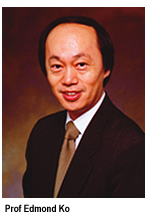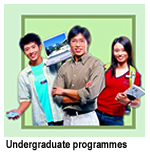On academic planning
Regina Lau and Shirley Lam
What is a growth / priority area as mentioned in the UGC announcement?
As recommended by the UGC, the first-year first degree places will remain unchanged for the 2005-08 triennium. What are the implications for the University’s overall academic development and planning?
We asked for an extra 100 first-year first degree places in our ADP. We have also voiced our aspiration to increase the creative media student intake—that has been endorsed. Now that the UGC advises our overall first-year first degree places to remain unchanged, that means we need to adjust the overall student intake among faculties / schools. The redistribution of student places will be done in a way that is consistent with what we originally proposed in our ADP.
What about the extra 210 places the UGC has allocated for our second-year intake? Are you happy about the quota?
Out of the total 840 second year places the UGC allocates to all eight funded institutions, our portion, which amounts to one quarter of the whole allocation, is the second biggest. This is an acknowledgement of our experience and achievements in the AD articulation programmes. What is even more encouraging is that the UGC has endorsed our proposal of two new programmes: an AD articulation programme on Criminology, and a joint programme with the Hong Kong Institute of Education on the Teaching of English.
What is the timeframe in implementing the proposed ADP, now that UGC has endorsed it?
Now that UGC has endorsed our direction and has specified our student intake, further major changes on the proposed ADP will not be likely. Professor H K Chang, the President, Professor David Tong, the Deputy President, and I have met the Core Group of the UGC twice, discussing in detail the principles in allocating student places among the various faculties/ schools: such as demand as indicated by student enrolment in the past few years; whether it is a growth area, like logistics and IT, as indicated by the government; whether the allocation is consistent with the new role statement UGC has defined for our University.
After some more adjustment and fine-tuning on the allocation, we will submit student load matrices to the UGC for funding assessment on 5 June this year.
What are the implications on funding for the 2005-08 triennium?
If we look at funding from the perspective of student enrolment, I would say that I am cautiously optimistic about our prospects. Since it is clear now that our undergraduate enrolment will not drop—in fact, it will grow by 420 for the second- and third-year intakes—I think the funding scenario is likely to be quite stable. After all, funding is related to number of student places.


